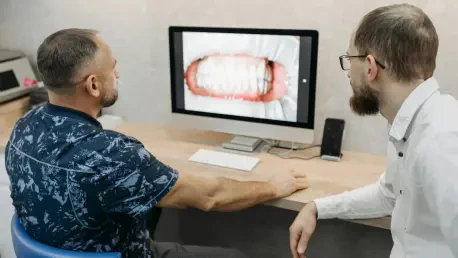The ongoing debate surrounding UK immigration laws and their effects on various professions often centers on systemic challenges and far-reaching implications for skilled workers abroad. Among these, overseas-trained dentists face significant barriers when attempting to practice in the United Kingdom, leading to a waste of talent. Despite their qualifications, these professionals frequently find themselves diverted from their intended careers due to daunting registration processes and immigration hurdles. The situation not only frustrates talented individuals but also impacts patients needing dental care, especially within the NHS, at a time when healthcare demands are growing. This conundrum raises questions about the country’s commitment to efficiently integrating skilled foreign labor.
Navigating a Complex Web of Challenges
Overseas dentists seeking to work in the UK are confronted with a series of substantial logistical, legal, and professional obstacles. These begin with the professional registration process, which remains convoluted and time-intensive. The prolonged delays in accessing necessary registration exams often lead skilled professionals from diverse backgrounds to take up less relevant roles merely as a means of staying in the country. This is particularly evident in scenarios where overseas-trained dentists opt for interim jobs that starkly contrast with their expertise, such as in fast-food outlets. Neil Carmichael, chair of the Association of Dental Groups (ADG), highlights this as a wasteful scenario, pointing to not only the effect on overseas dentists but also the missed opportunities for patients who rely on timely, skilled care.
Furthermore, beyond registration, the additional logistical concerns add layers of complexity to the hiring process from overseas. Visa requirements, compliance issues, and onboarding logistics remain formidable challenges. The high costs and time-consuming nature of these processes are often exacerbated by a lack of understanding and familiarity with the UK’s immigration and employment systems. Pam Lindsay-Dunn of Hays UK and Ireland acknowledges this far-reaching issue, positing that while the logistical hurdles are considerable, advancements in digital onboarding and remote work infrastructure can mitigate these challenges. She advocates for more inclusive candidate experiences to make the transition smoother and maximize the potential of overseas recruits.
Multidimensional Legal Barriers
Legal obstacles further compound the intricate maze confronting overseas-trained dentists. Understanding the nuances of UK immigration and hiring laws is daunting, often discouraging prospective employers from pursuing these talented candidates. Barbara Matthews emphasizes the criticality of expert consultation to navigate legal terrain effectively. This becomes particularly relevant as legislative changes loom, influencing salary benchmarks and skill thresholds that define eligibility. Employers are urged to adopt well-defined relocation policies encompassing comprehensive relocation packages and support systems to assist candidates in understanding immigration protocols, which is both necessary and beneficial.
Moreover, significant variations in training standards across countries pose qualification disparities, creating another facet of the challenge. Differences in teaching methodologies, exposure to cutting-edge technologies, and the prevalence of diverse clinical practices mean that not all potential recruits match the UK’s expectations. Robin Chater from the Federation of International Employers suggests that these disparities necessitate a careful evaluation process to ensure that recruits are adequately equipped to meet UK standards. Bridging these gaps requires substantial investment in training and adaptation programs to align globally diverse skill sets with local demands.
Fostering Global Integration and Trust
Improvements in language proficiency, international market integration, and employer positioning as global leaders in talent acquisition are necessary for successful overseas hiring. Language barriers remain a significant challenge; despite many candidates having proficient English skills, the level required for effective interaction within professional settings in the UK is often unmet. Especially in smaller practices where practitioners manage diverse tasks, communication barriers can impede efficient service delivery. Overcoming this challenge necessitates specialized language training that aligns with the professional demands of the dental sector.
Furthermore, the emphasis on fostering trust and market integration at an international level opens a pathway toward long-term success for overseas employment. Pam Lindsay-Dunn advises that projecting an image of a global employer of choice increases the attractiveness of positions. Such strategic positioning encourages international applicants and enhances the UK’s ability to compete effectively in the global talent market. The overarching consensus reflects a pressing need for systemic reforms to enable a seamless and productive integration of skilled foreign workers, thereby alleviating the pressures on services, such as the National Health Service (NHS). Ben Maitland of Vanessa Ganguin Immigration Law highlights these needs while guiding employers on proactive strategies.
Stepping Towards Potential Solutions
The current debate about UK immigration laws underscores the systemic challenges and broad implications for skilled workers globally. Among these professionals, overseas-trained dentists encounter considerable obstacles when trying to practice in the UK, resulting in a significant waste of talent. Despite their educational qualifications, these dentists frequently struggle with complex registration processes and the hurdles imposed by the immigration system. This situation not only frustrates the talented individuals involved but also has a negative impact on patients needing dental care, especially within the National Health Service (NHS), at a time when the demand for healthcare services is on the rise. This conundrum highlights the need to critically evaluate the UK’s commitment to effectively integrating skilled foreign labor into the workforce. By addressing these barriers, the UK could better utilize foreign-trained professionals, which may help mitigate the growing healthcare demands and enhance the accessibility of dental care for NHS patients.









